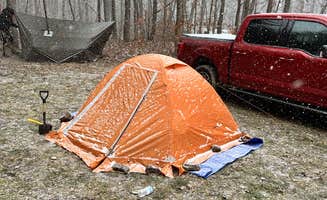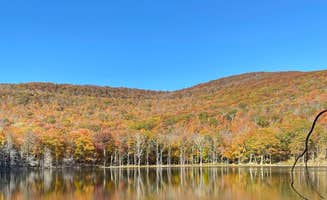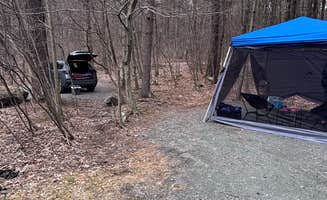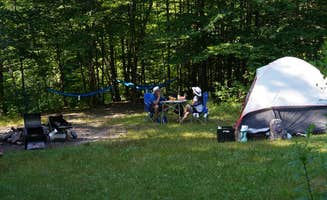Dispersed camping near Rensselaerville, New York provides access to the northern edge of the Catskills, with elevations ranging from 1,200 to 2,000 feet throughout nearby state forests. Primitive camping options extend across multiple state forest tracts that surround the town, creating a mosaic of public lands with varying terrain and watershed features. Winter temperatures in the region frequently drop below freezing from November through March, making seasonal preparation essential for cold-weather campers.
What to do
Fishing opportunities: At Fort Plain Lock 15 on Empire Trail, campers can fish directly from the parking area with proper licensing. One visitor notes, "The parking lot is large, rocky, and uneven, situated right on the Mohawk River. It's a great spot for wildlife viewing and fishing (with a valid license)."
Hiking and mountain views: Echo Lake offers access to Catskill trails with elevation gains. A camper reports, "We camped on the hill with a beautiful view of the whole lake and breeze." The surrounding hills provide natural windbreaks for tent sites while offering panoramic views.
Biking on nature trails: Ushers Road State Forest includes bicycle-friendly trails that connect to varied terrain. A visitor describes, "I explored both directions on my bike, riding approximately half a mile down each side. The terrain eventually transitions into a low-lying, swampy area."
Stream exploration: Many primitive campsites in the area feature stream access for cooling off during summer months. Ponds and small waterways typically remain accessible year-round but may require additional hiking during wet seasons when roads become less passable.
What campers like
Solitude and remoteness: The region's dispersed camping appeals to those seeking minimal interaction with other visitors. One camper at Betty Brook Camp shares, "Love to camp here all year long have been coming to the area for a couple of decades now. Remote. Sometimes you never see anyone."
Natural water features: Campers consistently mention proximity to water bodies as a highlight. At Allaben Primitive Campsites, a visitor notes, "Small pond-don't think there are any fish. Picnic table. Fire pit with cooking griddle. Trails to the fishing access across the road."
Accessible wilderness: Many sites balance remoteness with reasonable access. One camper at Echo Lake describes it as "perfect" for a first backpacking trip: "There are tent sites around the whole lake with fire pits and 1 lean-to site at the end of the trail when you first arrive at the lake. The sites are relatively flat and well shaded with trees."
Wildlife viewing: The diverse ecosystems support abundant wildlife observation opportunities. Multiple reviews mention encounters with deer, birds, and small mammals, particularly at dawn and dusk when activity increases around water sources.
What you should know
Road conditions: Access roads to many dispersed sites remain unpaved and can deteriorate seasonally. At Denning Trailhead Peekamoose Primitive Camping, visitors should prepare for "Great camping spots about 1.5 mile hike in from Denning Trailhead. A lot of spots right by the river."
Cell service limitations: Coverage varies significantly across the region, with higher elevations generally offering better connectivity. Some areas provide adequate service for emergency calls while valleys and densely forested areas may have no signal.
Noise considerations: Not all primitive sites offer complete silence. One camper at Fort Plain Lock 15 notes, "It still has the highway noise and of course the train noise going by, but I love that." Sites deeper in state forests typically provide more buffer from transportation sounds.
Seasonal crowds: Echo Lake experiences higher visitation during peak summer months. A camper observed, "It does get a little crowded later in the day so you may have to share space with others and it can be a little noisy at night."
Limited facilities: Most dispersed camping requires complete self-sufficiency. Potable water sources are rare outside developed areas, with Fort Plain Lock 15 being an exception, offering "pit toilets, a dumpster, and potable water available on the side of the building as you enter."
Tips for camping with families
Bug preparation: Several camping areas near water sources experience seasonal insect activity. A visitor to Echo Lake advises, "Note, it can get swampy near the edge of the lake so you may want to bring bug spray."
Site selection for kids: When camping with children, choose locations with natural boundaries. Look for sites with gradual slopes rather than steep drop-offs and avoid camping directly under damaged or dead trees that could pose safety hazards.
Weather planning: The region experiences significant temperature fluctuations between day and night, particularly in spring and fall. Pack additional layers for children who may be more sensitive to overnight temperature drops, especially at higher elevation sites.
Stream safety: Many campsites feature water access that children find appealing. Monitor water levels after rainfall when normally calm streams can become faster moving. Small waterproof shoes can help prevent slips on algae-covered rocks common in the area's waterways.
Tips from RVers
Parking surface conditions: At Burnt Rossman State Forest - Westkill Camp, a visitor cautions, "This spot is right off the road. Nice and quiet. There is enough room for 2 to 3 campers. Parking across the street if it's wet. Entrance is soft."
Size limitations: Most dispersed sites accommodate smaller recreational vehicles only. A local resident commenting on Betty Brook Camp advises, "I would not recommend this for large trailers. The site is fairly small, but it's in state park, and there's tons of walking that can be done."
Turn-around space: Many forest roads lack adequate turning radius for larger rigs. Scout ahead for suitable spots to turn around before proceeding down unfamiliar roads, particularly after rainfall when soft shoulders can create hazardous conditions for heavy vehicles.
Level parking: Bring leveling blocks as most primitive sites lack graded parking areas. Sites near streams often feature slight inclines toward the water that require compensation for comfortable overnight stays.





